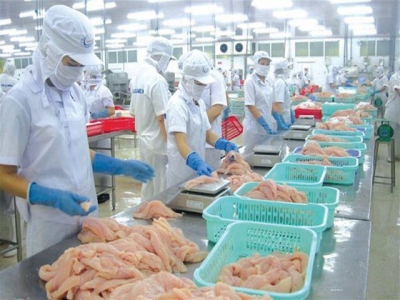Vietnams catfish sector faces slander campaigns in foreign media

Vietnam’s catfish has run into trouble in several EU countries because of misleading information in the media.
According to the Vietnam Association of Seafood Exporters and Producers (VASEP), online newspapers in Romania such as Realitate.net, Ziuanews.ro, Bzi.ro, Adevarul.ro, Puppe.ro and Secretulsanatatii.net have posted inaccurate information about Vietnam’s catfish industry, thus having adverse effects on Vietnam’s catfish exports to the country.
Duong Nghia Quoc, chair of VINAPA (Vietnam Pangasius Association), said the newspapers repeated the old information which previously had appeared in some EU countries.
The newspapers wrote that Vietnam’s catfish was infected with chemicals because the Mekong River is seriously polluted with plant protection chemicals.
Vietnam’s catfish has run into trouble in several EU countries because of misleading information in the media.
Quoc noted that the reporters could not point out when and which export consignments from Vietnam were found having chemical residue.
The articles recommended Romanian customers not eat dishes related to Vietnam’s catfish and called on customers to boycott catfish
In early 2017, Cuatro TV in Spain also reported in a program that Mekong River’s water which is used to farm catfish in Vietnam, is polluted, so Vietnam’s catfish is not safe. The TV program then led to Carrefour’s decision not to sell Vietnam’s catfish products within the network.
In 2011, a TV channel in Germany broadcast a documentary film, describing Vietnam’s catfish as cheap low-quality fish because the fish is farmed in polluted waters of the Mekong.
Seafood companies complained that because of the repeated media campaigns which provide inaccurate information, it has been more difficult to export catfish to the EU.
Vietnam’s catfish export turnover to the market in the first five months of the year was $75 million, which accounted fo 9.5 percent of the industry’s total export turnover.
The EU, which was once the biggest export market which consumed 50 percent of export turnover, has fallen to the fourth position, after China-Hong Kong, the US and ASEAN.
Phung Thi Lan Phuong from WTO Center, an arm of the Vietnam Chamber of Commerce and Industry (VCCI), said the slander campaign arose from businesses and this has no relation with the governments of the countries.
“This is a problem among businesses which play dirty on Vietnam’s products. Therefore, this cannot be settled through trade pacts,” Phuong said.
She went on to say that as the alleged slanderer is out of Vietnamese territory.
Meanwhile, Kieu Anh Vu from KAV Lawyers, said in this case, where Vietnam’s catfish is smeared, Vietnam’s businesses and associations need to take action to protect their products.
They can protest against the organizations which provided false information, asking them to correct the information and sue for damages.
Có thể bạn quan tâm
 Vietnam catfish qualified for export to the US
Vietnam catfish qualified for export to the US According to the Food Safety and Inspection Service (FSIS), the fish inspection system for siluriformes in Vietnam, China, Thailand are equivalent to U.S. stand
 Sugarcane derivative improves FCRs in fish and shrimp farms
Sugarcane derivative improves FCRs in fish and shrimp farms Trials of a new patented feed additive, derived from the sugarcane plant (Saccharum officinarum) suggest its ability to improve growth rates and feed conversion
 US lowers duty on Việt Nam’s shrimp exports
US lowers duty on Việt Nam’s shrimp exports The US government lowered the anti-dumping duty on frozen warm water shrimp from Việt Nam.